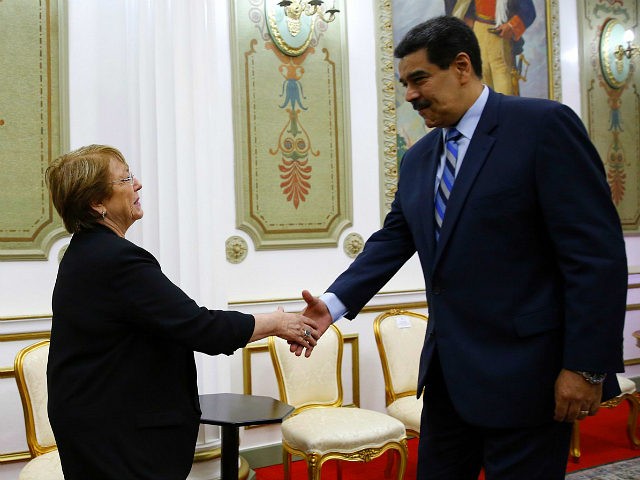United Nations High Commissioner for Human Rights Michelle Bachelet met with members of the Maduro regime, the opposition, and human rights groups during her visit to Venezuela this week.
Bachelet is expected to publish a report on the dire human rights situation in Venezuela following her visit.
Bachelet, who developed ties with the socialist regime during her tenure as president of Chile, held meetings with Foreign Minister Jorge Arreaza and Attorney General Tarek William Saab on Wednesday evening. After the meeting, Arreaza expressed a willingness work with the high commissioner to “correct what needs to be corrected … in order to preserve the human rights of Venezuelans.”
Both sides also discussed the impact of U.S.-led sanctions on the Venezuelan oil industry. The 67-year-old has previously criticized the measures, which Washington says are aimed at removing the Maduro regime from power, arguing that they were “aggravating the economic crisis, with possible repercussions on people’s basic rights and wellbeing.”
Bachelet arrived in the country on Wednesday as part of a fact-finding mission into alleged abuses by the Maduro regime, which has not been legally in power since January but continues to control the military and the presidential palace. According to a report from the Times of London, passengers on her flight from Panama recognized her and began to pass forward scraps of paper with messages urging her to help remove the Maduro regime from power.
On Thursday, Bachelet met with the families of anti-government activists imprisoned by the regime and human rights groups such as the Venezuelan Penal Forum, an NGO that documents prisoners of conscience in the country.
As reported by the Argentine outlet Infobae this week, the Maduro regime made extensive preparations for Bachelet’s visit in the hope that a positive report would relieve growing international condemnation of the regime. The preparations reportedly included freeing around 21 opposition activists and ordering a “clean-up” of the Heliocide prison facility in Caracas, where the country’s most high-profile political prisoners are currently detained.
There have been numerous reports of egregious human rights violations from within the facility, including the use of torture and prisoners forced into dire living conditions. The Maduro regime notably did not allow Bachelet to visit the prison, a former shopping mall, during her trip, a move criticized by other human rights campaigners.
On Friday, Bachelet met with President Juan Guaidó, the nation’s legitimate head of state following the lapse of Maduro’s last presidential term in January. Following their meeting, Guaidó told reporters that Bachelet planned to leave two members of her team in the country to further assess the chronic lack of food and medicine and the wider human rights situation across the country.
“For us, beyond using the visit to draw attention to the systematic abuse of human rights in Venezuela, we used it to talk about real solutions to the crisis,” Guaidó said following the meeting.
Protests also broke out in Caracas on Friday as protesters sought to remind Bachelet of the regime’s record of extrajudicial killings, the imprisonment of opposition activists, and attacks on the free press.
In February, Bachelet issued a statement urging the regime to “stop its forces from using excessive force against unarmed protesters and ordinary citizens” and expressing concerns about attacks on freedom of the press. The international community will now await her report that will provide a clearer picture of her findings throughout the visit.
Follow Ben Kew on Facebook, Twitter at @ben_kew, or email him at bkew@breitbart.com.

COMMENTS
Please let us know if you're having issues with commenting.